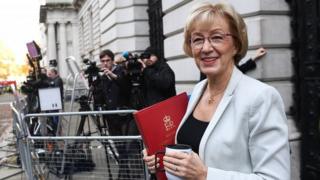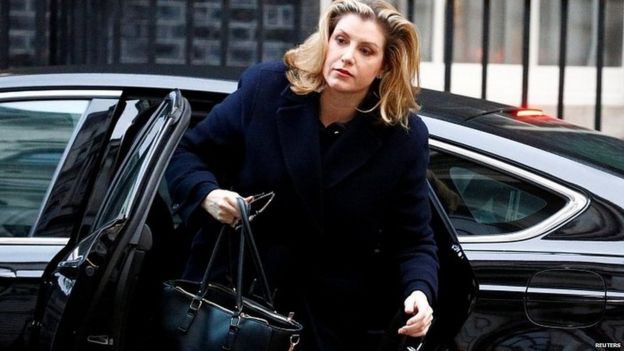UK significantly closer to delivering Brexit, says May
The UK is "significantly closer" to delivering on the result of the Brexit vote, Theresa May has told MPs.
The prime minister was speaking before a crunch cabinet meeting where she is seeking her senior ministers' backing for the UK and EU's draft agreement.
She told the Commons it would give the UK control of borders, laws and money - and also protect business and jobs.
But Jeremy Corbyn said the UK would be stuck in an "indefinite half-way house without any real say" over the rules.
Speaking at Prime Minister's Questions, the Labour leader said Mrs May was putting a "false choice" before Parliament between her "botched deal and no deal".
But Mrs May said Labour's objective was to "frustrate Brexit and betray the vote of the British people".
Crunch meeting ahead
The BBC's Norman Smith said the prime minister would seek to head off the threat of any resignations by telling her cabinet ministers that while not perfect, the agreement was as good as it can get.
Downing Street, he added, were pointing to what they view as significant wins, including no separate customs border for Northern Ireland and an arbitration mechanism to ensure the UK can exit the proposed "backstop" customs plan.
Ministers - including Brexiteers like Liz Truss, Esther McVey and Penny Mordaunt - have been filing into Downing Street to get their first look at the agreement in a special reading room, amid speculation about further resignations.
What's been agreed?
The draft withdrawal agreement addresses the Northern Ireland "backstop", which aims to guarantee that physical checks will not be reintroduced at the border with the Irish Republic, in the event of the EU and UK failing to agree a deal on future trading relations that involves not having a physical border.
This has proven the most contentious part of the withdrawal negotiations, with concerns raised by Brexiteer Tories and the DUP over how it will work.
The backstop within the agreed draft is believed to avoid a return to a "hard border" with the Republic by keeping the UK as a whole aligned with the EU customs union for a limited time.
However, some Brexiteers fear this will keep the UK locked into EU trade rules for years.
The agreement also includes commitments over citizens' rights after Brexit, a proposed 21-month transition period after the UK's departure on 29 March 2019 and details of the so-called £39bn "divorce bill".
The future relationship statement is expected to be far shorter, with the UK and the EU's long-term trade arrangements yet to be settled.
What happens next?
If the cabinet signs it off, the EU Commission is expected later to publish the details of the 500-page draft withdrawal agreement as well as the much shorter declaration on future economic and security relations.
Ambassadors from the remaining 27 EU member states will discuss the possibility of organising an emergency summit later this month to sign off on it.
Irish prime minister Leo Varadkar has signalled the summit could take place on 25 November.
If this happens, the government will then face a battle to win Parliament's backing, in a vote the BBC's Laura Kuenssberg said could take place around 7 December.
Analysis
By BBC political editor Laura Kuenssberg
It doesn't seem to me that many of the cabinet are likely to walk on Wednesday over what's in the document.
It's suggested that those with bigger doubts are more likely to cause problems for the prime minister because it won't get through Parliament.
One source told me senior ministers are thinking not just about the wisdom of backing a deal they don't like because it's a sour compromise, but whether it is folly to back a deal they believe can't get through Parliament.
Slamming on the brakes now would force a crisis, but it could be less serious than the political disaster of pursuing this plan to an eventual calamitous defeat that could take them all down.



No comments